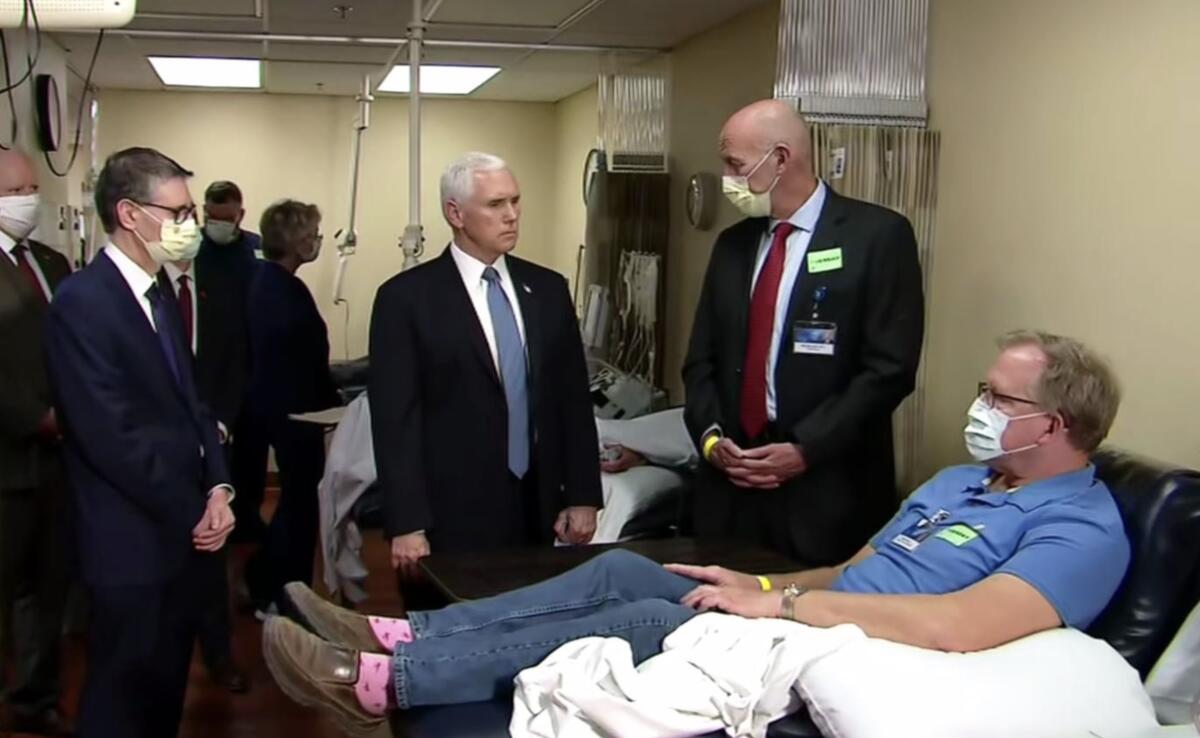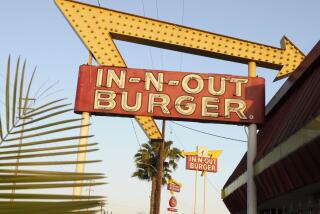No, wearing a mask isn’t for libs. It’s for people who don’t want to die

- Share via
The first long, hot walk I took in a cloth mask was lovely and liberating, until it wasn’t. The stroll became a trudge. Finally I was longing to get back inside, into my stuffy house, for a gulp of fresh air.
Nevertheless, I persist.
Wearing a mask is not only an act of respect for other humans in a viral world; it’s a plausible path to Ironman-caliber lung power, which we can flaunt the next time we can walk, sprint and cavort bare-faced.
At the same time, I’m trying to avoid thinking of the mask as a crucifix necklace or an Affliction-brand face tattoo, something that marks me as part of one fight club and not another. Because of course there are those who don’t and won’t wear masks. And it’s going to be a long, terrible summer if, as the coronavirus death toll mounts, the United States erupts in Sharks-Jets street fights over who masks and who doesn’t.
The semiotics of the mask contest are hard to miss.
Mask-rejecters are flouting public-health guidelines the way chain-smokers used to, grounding their individuality in their defiance of nanny-state edicts and in their outlaw freedom to trash their own health and endanger others.
Mask-wearers, by contrast, announce themselves as duty-bound citizens, proud to be up on the latest COVID-19 news, which means some are patronizing scolds. In New York City, mask devotees have taken to shouting at unmasked joggers, although there is scant evidence that joggers transmit the virus.
The battle over masks maps closely onto the dangerously inflamed red-blue divide. MSNBC field reporter Craig Melvin wears one. Fox News host Laura Ingraham, citing masks as advertisements for “fear and intimidation,” does not. President Trump, Vice President Mike Pence and Sen. Rand Paul (R-Ky.) have refused masks; House Speaker Nancy Pelosi (D-San Francisco) has a drawerful of handsome, practical cloth face coverings.
This daft showdown wouldn’t matter if we didn’t live in the political tinderbox that is Trump’s America. The mask wars have already turned costly. In Texas, workers in a reopening Dallas restaurant were told they were forbidden to wear masks or face coverings at work. Wear one, lose your job, in other words.
This would seem to be an especially self-defeating move for a restaurant. It’s akin to a salad bar manager banning sneeze guards and making sure customers knew about his rebellious new policy.
Mask politics have even turned deadly. On Monday, three family members were charged with first-degree murder for allegedly shooting to death a security guard at a Flint, Mich., Family Dollar Store after the guard asked a fourth family member to wear a state-mandated face mask in the store.
“Over a mask?” asked Tina James, a cousin of the victim, Calvin Munerlyn. “Over a mask?”
No kidding. And yet, face coverings, from veils to sunglasses to hoodies to balaclavas to beards, nearly always acquire cultural significance far beyond their purpose.
In 2011, France took the extreme measure of banning full-face coverings in public, except a few required for elite sports, like fencing masks. The policy, which passed under a center-right but highly secular government, was understood by progressives as a way to extend state surveillance by ensuring that faces could be registered on security cameras. It was also a clear case of religious bigotry against Muslims. (Now cities in Europe that have noisily complained about only seeing Muslim women’s eyes are noisily mandating coronavirus masks for one and all.)
Pandemics can bring out all kinds of irrationality in humans (the words “panic” and “pandemic” have the same Greek root). When angst sets in, lies go viral.
Nearly 1,500 years ago, the historian Procopius sternly warned the people of Constantinople against listening to sophists and astrologers during the Plague of Justinian. Desperate citizens were falling prey to charlatans — though, lucky for them, none as dangerous as a world leader advocating the use of intravenous bleach. (That would be ridiculous.) Nor do records show that anyone was advised to spurn their anti-plague cone masks. What do you think, the people of the Early Middle Ages, for whom a handful of leeches was the height of biotech, were idiots?
A few hundred years later, in “A Journal of the Plague Year” (1722), Daniel Defoe notes that the anti-mask crowd of his day came to unfortunate ends: “Abundance of quacks too died, who had the folly to trust to their own medicines.”
Today’s quacks want us to believe masks are for libs, which I guess redefines “lib” as someone who does not want to die. Wearing a mask to protect yourself and others is not an affectation. it is not the new latte or avocado toast. I can say with certainty that hot, soggy masks are a far cry from even diner coffee, and wearing one around Ralphs does very little for your social status.
Wear a mask anyway. Do it even if your heroes object. Let it signify this fact: Whatever your politics, you have a pronounced bias for health over sickness.
More to Read
A cure for the common opinion
Get thought-provoking perspectives with our weekly newsletter.
You may occasionally receive promotional content from the Los Angeles Times.









